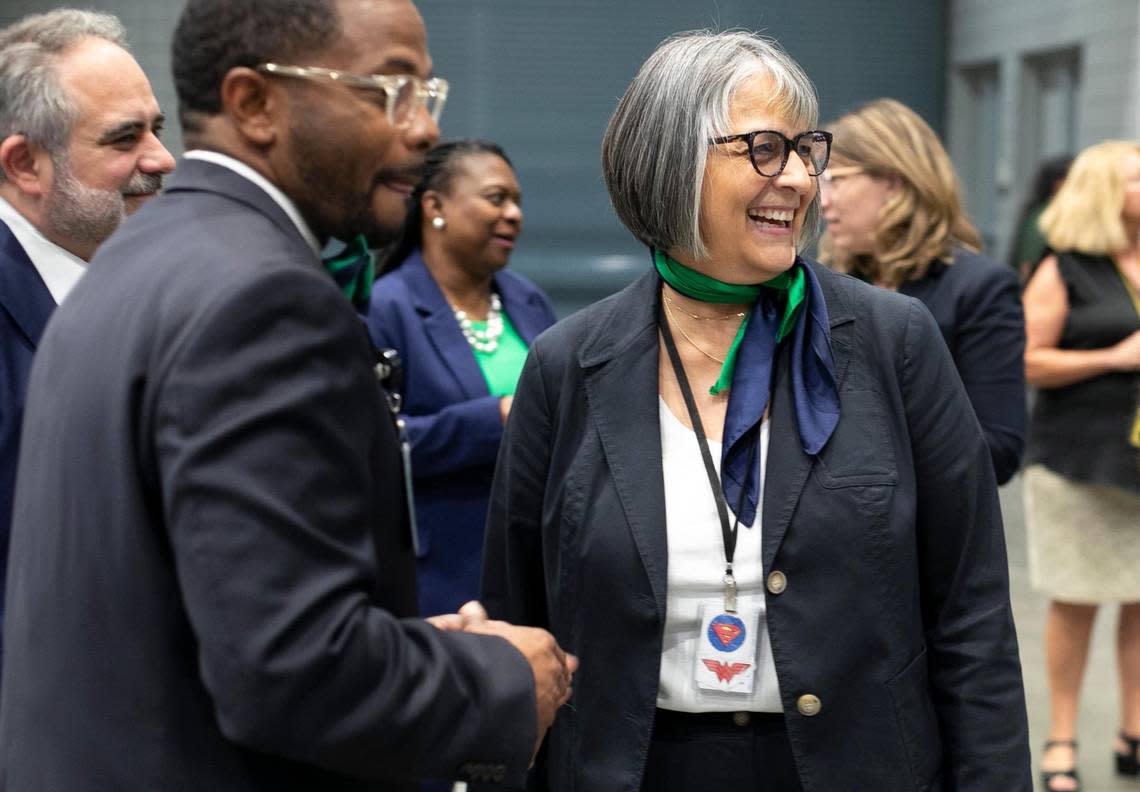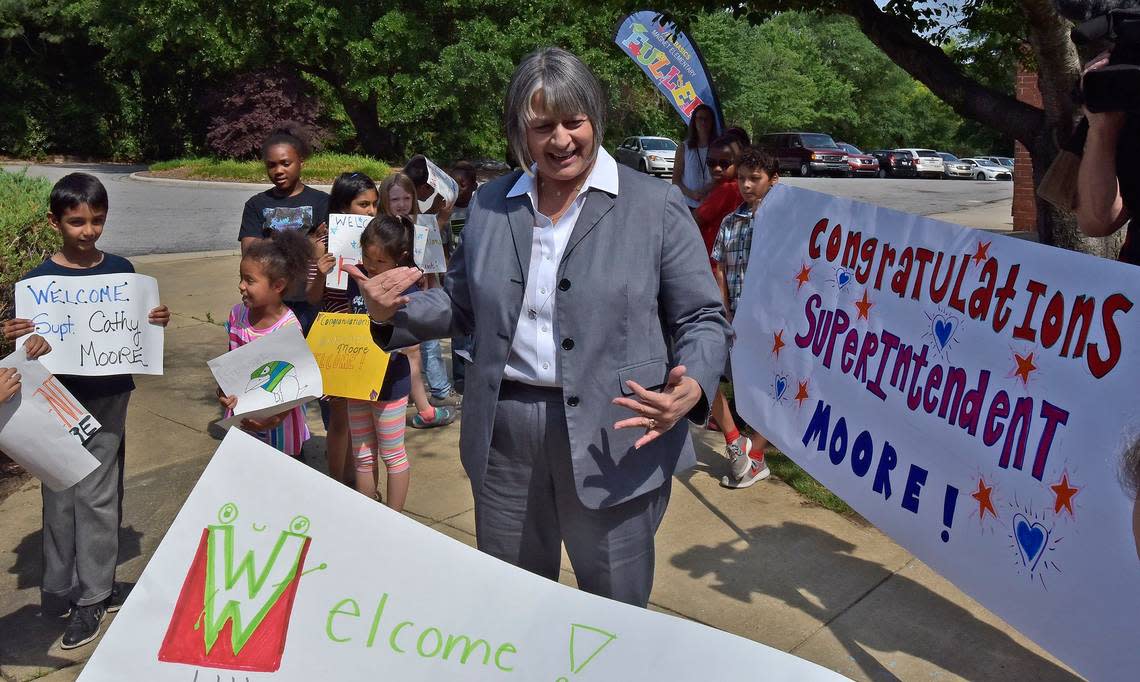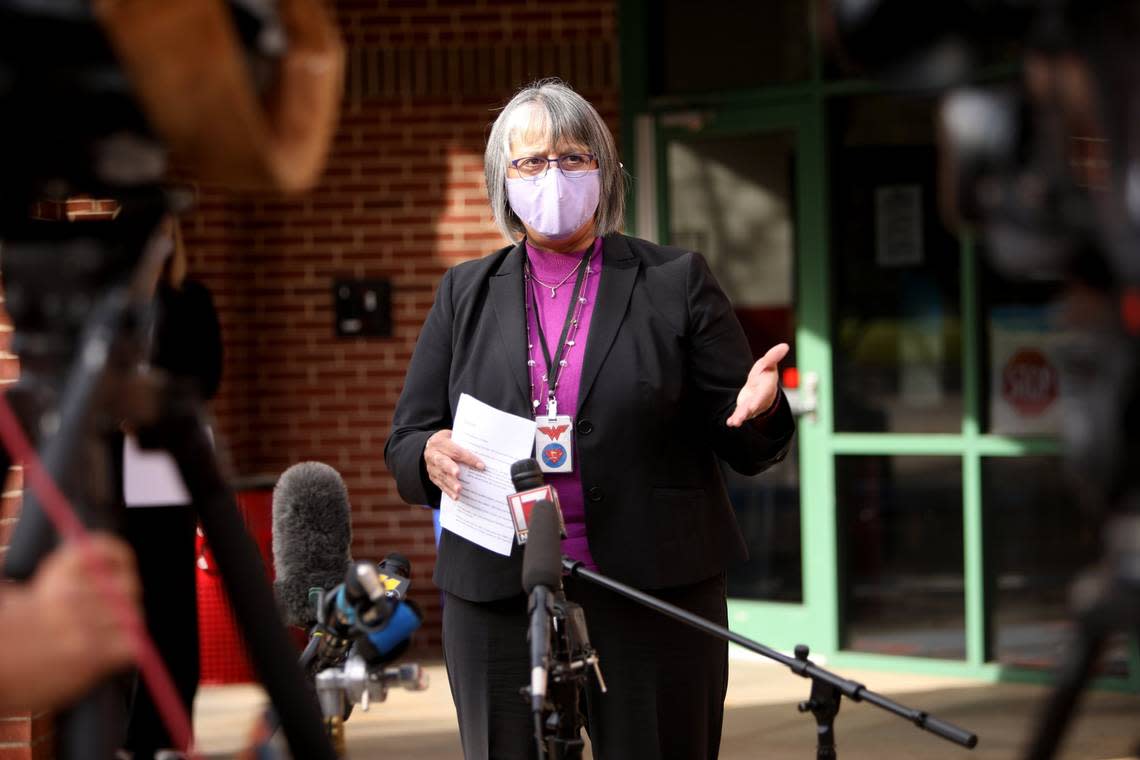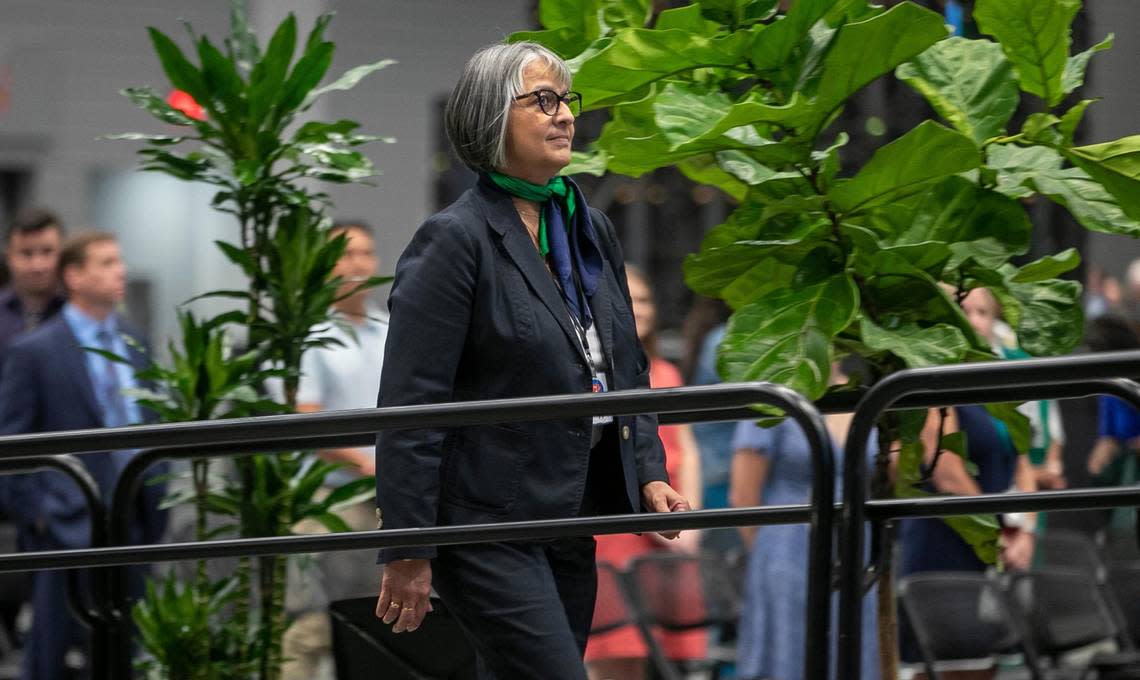Wake superintendent broke barriers and led through pandemic. Why she’s now retiring.
Catty Moore has helped shape the future of thousands of Wake County students for more than a generation, first as a teacher and school administrator and now as district superintendent.
But 35 years of service in Wake County will come to an end this month when Moore, 59, retires from her job of leading North Carolina’s largest school district. Moore said she’s taken an “all hands, all feet in” approach over the years that helped guide Wake through challenges such as an unprecedented pandemic.
“Having been in the community for as long as I have, I do know bus drivers,” Moore said in an interview last week with The News & Observer. “I know their kids. I know cafeteria workers. I know people at all levels of the organization, and I think that’s fabulous and a gift.”
Moore’s supporters say her five years as superintendent showed her grace under pressure as she kept her attention focused on serving Wake’s 160,000 students.
“I’ve been nothing but impressed by her, especially by the way she led us all through the pandemic,” Teresa Jones, president of the Wake County PTA Council, said in an interview. “I am grateful for her sticking around for as long as she did after that. She did a great job under very difficult circumstances.”
But Moore’s critics say it’s time for a change in leadership. Wake is in the midst of recovering from pandemic learning losses while also dealing with national culture war issues such as what books to allow in schools.
“While we wish Moore well on her retirement, we are looking forward to a new Superintendent,” Julie Page, chair, and Becky Lew-Hobbs, vice chair, of the Wake County chapter of Moms for Liberty, said in a joint statement. “Moore leaves us with a plethora of problems to resolve.”
Wake’s first female and Latina superintendent
Moore, whose maiden name is Quiroz, was 2 years old when her family moved from Ecuador to the United States. She went for decades by the first name of Cathy before changing last year to go by her legal first name of Catty.

Moore went on to become the first member of her family to graduate from college. After initially planning to be an engineer, she opted for teaching and relocated to Wake in 1988 to teach French at Enloe High School in Raleigh.
She rose through the ranks in Wake and was put in charge of overseeing academics as deputy superintendent in 2011. In 2018, Moore became Wake County’s first female and first Latina superintendent.
“She broke the glass ceiling and created a path for people like me and students that you can do anything,” Rocío Anderson, president of the North Carolina Society of Hispanic Professionals, said in an interview.
Anderson and Zamantha Granados, partnerships manager for the non-profit group LatinxEd, said Moore put the district’s commitment to diversity, equity and inclusion into practice with expanded services to help students of color.
This includes more interpreters to provide translation services and additional support for the district’s Center for International Enrollment and Family Academy program..
“We were blessed to have her,” Granados said in an interview. “Wake County is a county that is growing exponentially and also seeing an increase in refugees and mixed status families, meaning households that may have people who are undocumented as well as documented living under the same roof.”
Superintendent connected to community
Wake County is the 15th largest school system in the nation. But Kristin Beller, the former president of the Wake County chapter of the N.C. Association of Educators, said Moore tried to make it feel as small as possible to the families and school employees.

Beller said she was amazed how Moore took the time to write handwritten notes to teachers and could remember the names and faces of students she hadn’t seen in years.
“She held a loyalty to the parents, students and staff in Wake County that’s unique for a superintendent,” Beller said in an interview. “This was her community for so long.”
School board member Monika Johnson-Hostler was board chair when Moore was hired as superintendent. Johnson-Hostler can still recall how during a 2018 visit to Bryan Road Elementary in Garner that a parent introduced herself to Moore as one of her former students.
“She was so floored that her kid was connected to someone she had fond memories of,” Johnson-Hostler said in an interview.
Wake’s response during COVID pandemic
Moore’s leadership was put to the test during the COVID-19 pandemic, when the district shifted to remote learning in March 2020 and then to a hybrid of in-person and online classes. The district didn’t resume daily in-person instruction in all schools until April 2021. Face masks remained mandatory in classrooms until March 2022.

“Contrary to what some folks think, I’m not a physician and I didn’t want to act like a physician during the pandemic,” Moore said. “So I think it was really important for us to listen to the folks who were providing the guidance, who were giving us the recommendations on the work that we needed to do.”
Moore and the school board were relying on advice from groups such as the state Department of Health and Human Services and the ABC Science Collaborative formed by Duke University.
“We were also experiencing the pandemic and the trauma of the pandemic while making decisions for 160,000+ kids,” Johnson-Hostler said. “I certainly can say with all self assurance that the superintendent never lost sight of that we were making decisions for individuals with as much and sometimes as little information that was available to us.”
Moore was also a leader at the state level before, during and after the pandemic, according to Jack Hoke, executive director of the N.C. School Superintendents’ Association. Hoke said Moore’s contributions on the state’s Superintendents’ Reopening Task Force were invaluable.
“We know that her leadership will be missed, but her impact on education in North Carolina will continue to be felt for years to come,” Hoke said in a statement.
Moore took on all tasks during the pandemic
During the pandemic, Moore and other central office administrators volunteered at schools to help deal with short-staffing. Every Friday, Moore would do whatever was needed at Powell Elementary School in Raleigh, including substitute teaching, supervising recess, cleaning cafeteria tables and answering phone in the front office.
“At heart I am a teacher,” Moore said. “It is how I started. It was a pleasure. It was an honor and a privilege to work at Powell Elementary.”
Anderson of the Society of Hispanic Professionals watched her two sons graduate from high school during the pandemic.
“As a parent I was reassured at the end of the pandemic that we were going to be OK,’ Anderson said. “Now both of my boys are in college. As I look back, she did the right thing and the best she could to get us through the pandemic.”
But Wake’s decision to require face masks and not return to full-time, in-person classes sooner angered some parents. They were also upset about the rules put in place that limited school visitors during the pandemic.
“During the pandemic, Moore squandered the opportunity to partner with parents,” Moms for Liberty said in its statement. “Instead, she implemented policies that kept students out of the classroom, then later limited and sometimes barred parents from being present at all.”
How are Wake schools doing academically?
Test scores aren’t out yet for this school year. But, as of last school year, Wake’s passing rates on state exams were improving but still lower than they were before the pandemic.
In addition to the overall district drop in proficiency, Moms for Liberty points to statistics such as how passing rates on state reading exams for Black and Hispanic elementary students in Wake are both below 40%.
“Not coincidentally, since the Office of Equity Affairs was founded in 2013 and ramped up in 2020, she has allowed academics to take a back seat to social issues, political agendas and association (NCAE) demands,” Moms for Liberty said.
But Moore calls it a “false narrative” to say that Wake isn’t doing well academically. She says Wake is in the top 10% of school districts in North Carolina in proficiency. She also points to how Wake has the highest percentage of schools meeting or exceeding growth targets on state exams in 10 years.
“We’re not doing a terrible job of educating our students,” Moore said. “ We’re doing a really good job, and there is much work left to be done. Both of those are true.”

Academic performance over the last three years should be looked at with an asterisk due to the pandemic, according to Keith Poston, president of the WakeEd Partnership. But Poston, whose business-backed group supports the district, said the recovery Wake has been making academically is remarkable.
“I would have loved to see what she would have done without the pandemic,” Poston said in an interview. “But the fact is Wake County Public Schools is back and is growing and is continuing to deliver a world-class education offering a broader curriculum to a more diverse student body than ever before. I think she has positioned the district to do well moving forward.”
What Wake wants in next superintendent
Moore, though, says she doesn’t look back and wonder what things could have been like without the pandemic.
“I’m a person of faith and I do believe that I was here during the pandemic as I was supposed to be,” Moore said. “I do think as we’ve come out of this now, we’re back to a place of routines that are more established.”
Moore says she’s retiring now because she feels Wake is in a good place with a new strategic plan and new equity policy in place. She plans to relocate to Charlotte to spend more time with her family, particularly a grandson who is about to start kindergarten.
“I have no professional plans on July 1st,” Moore said. “I’m headed to the beach. My family is taking bets on how long I actually do nothing.
“There may be something else in my future. But whatever it is will have to be super flexible and something that I’m really passionate about.”
The school board is interviewing, behind closed doors, the applicants who want to replace Moore. Wake received 28 applications.
Former Orange County Superintendent Randy Bridges will serve as interim superintendent until the new superintendent starts.
The next superintendent should be an educator who has high standards of integrity and is willing to listen to others, according to parents and school employees who filled out surveys.
School board chair Lindsay Mahaffey says the next superintendent should be like Moore in having both a high intelligence quotient and a high emotional quotient. Mahaffey said the superintendent needs to understand how the building program, human resources and academics work while also being responsive to the community.
“We can’t recreate Catty Moore and what she’s given to this county,” Mahaffey said.
